Charles E W Bean, Diaries, AWM38 3DRL 606/119/1 - Photostats - Part 4
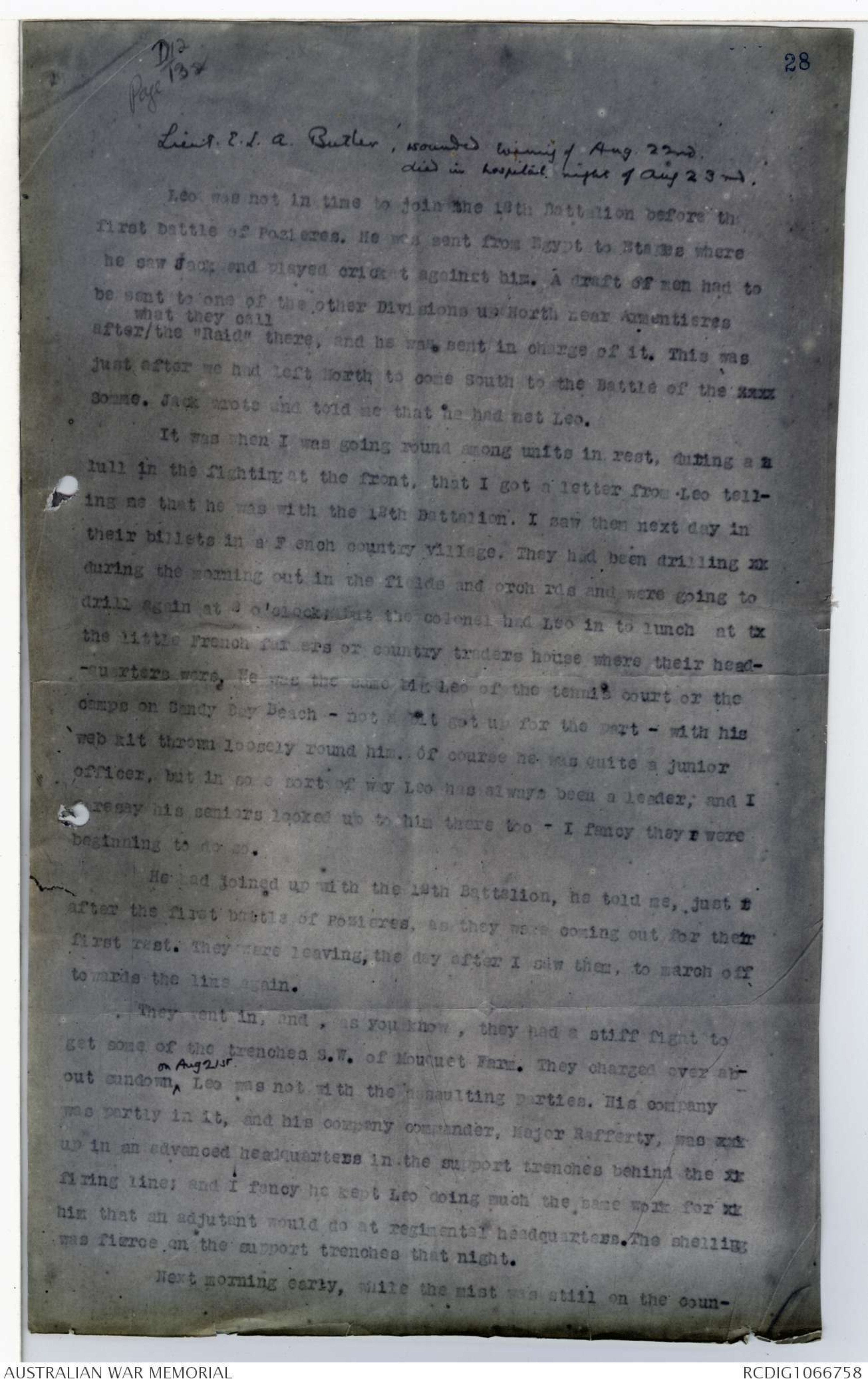
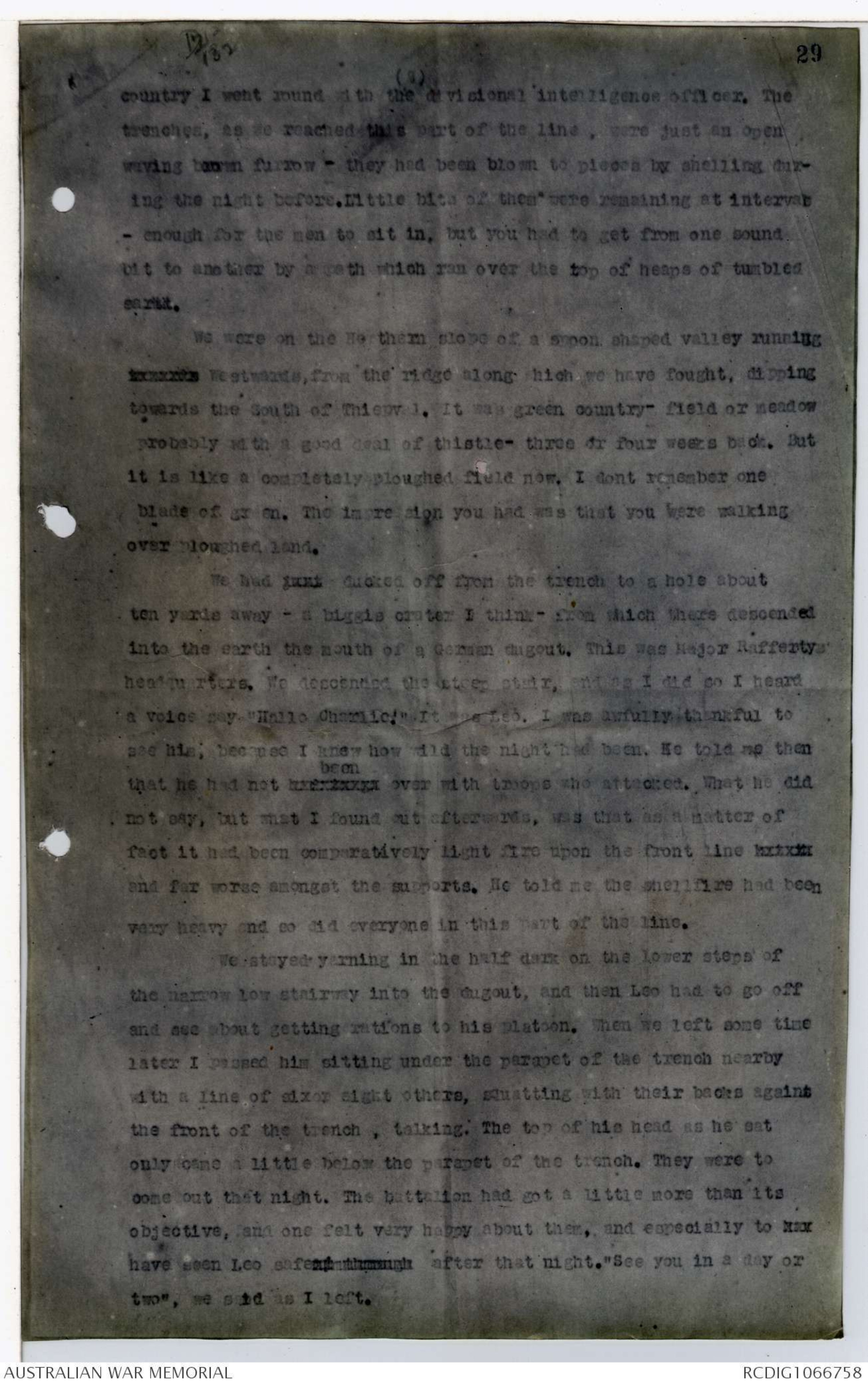
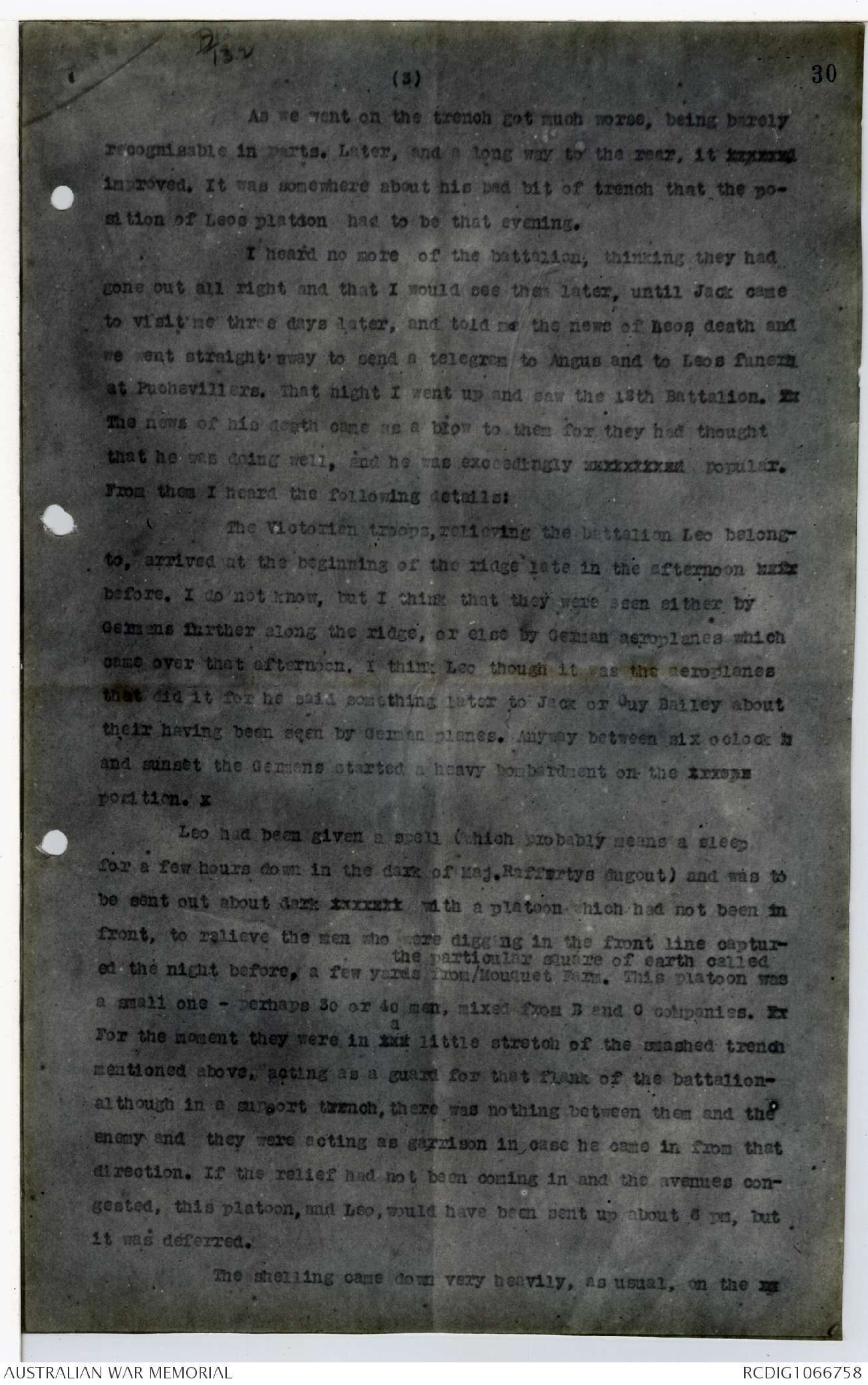
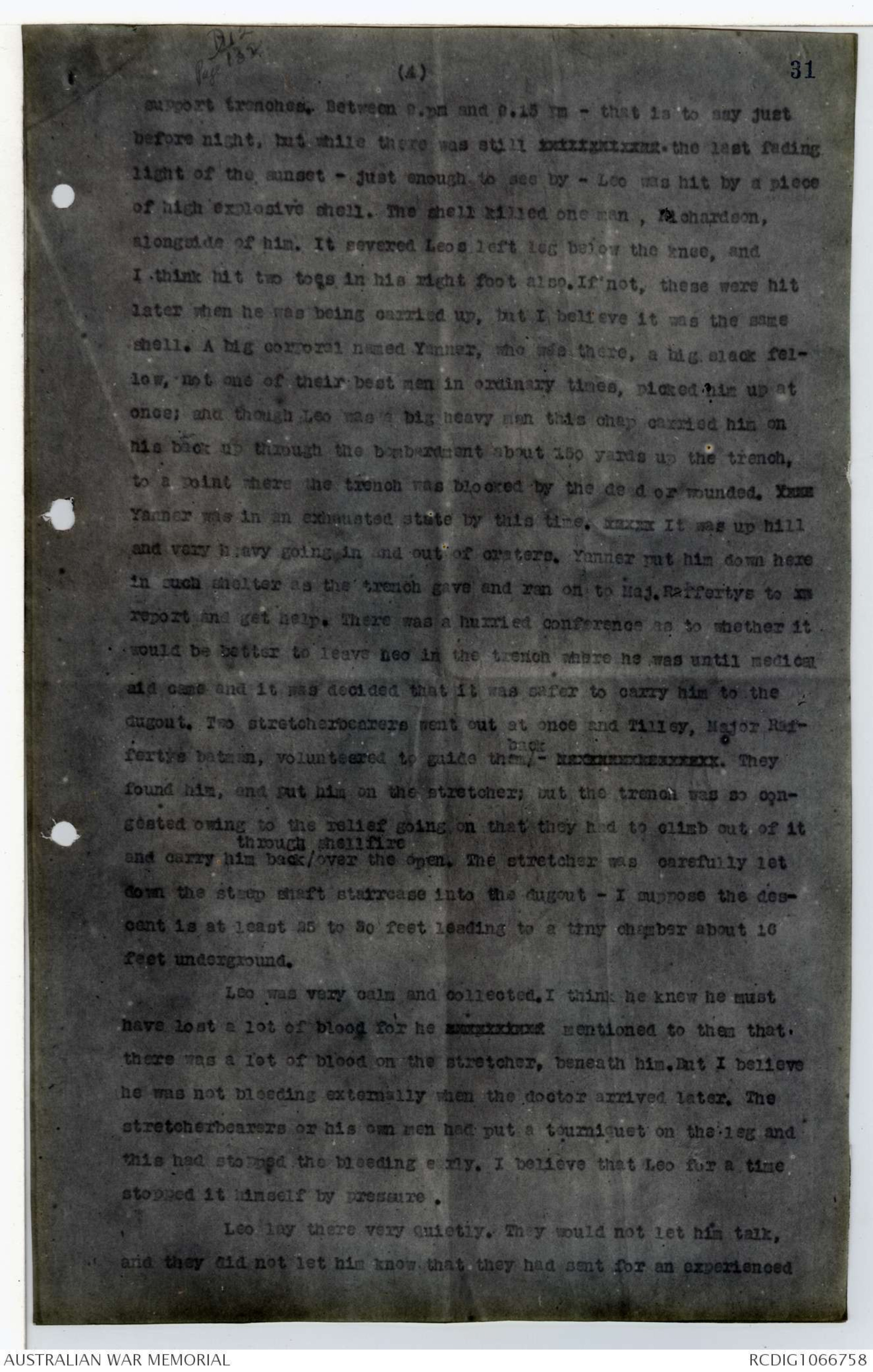
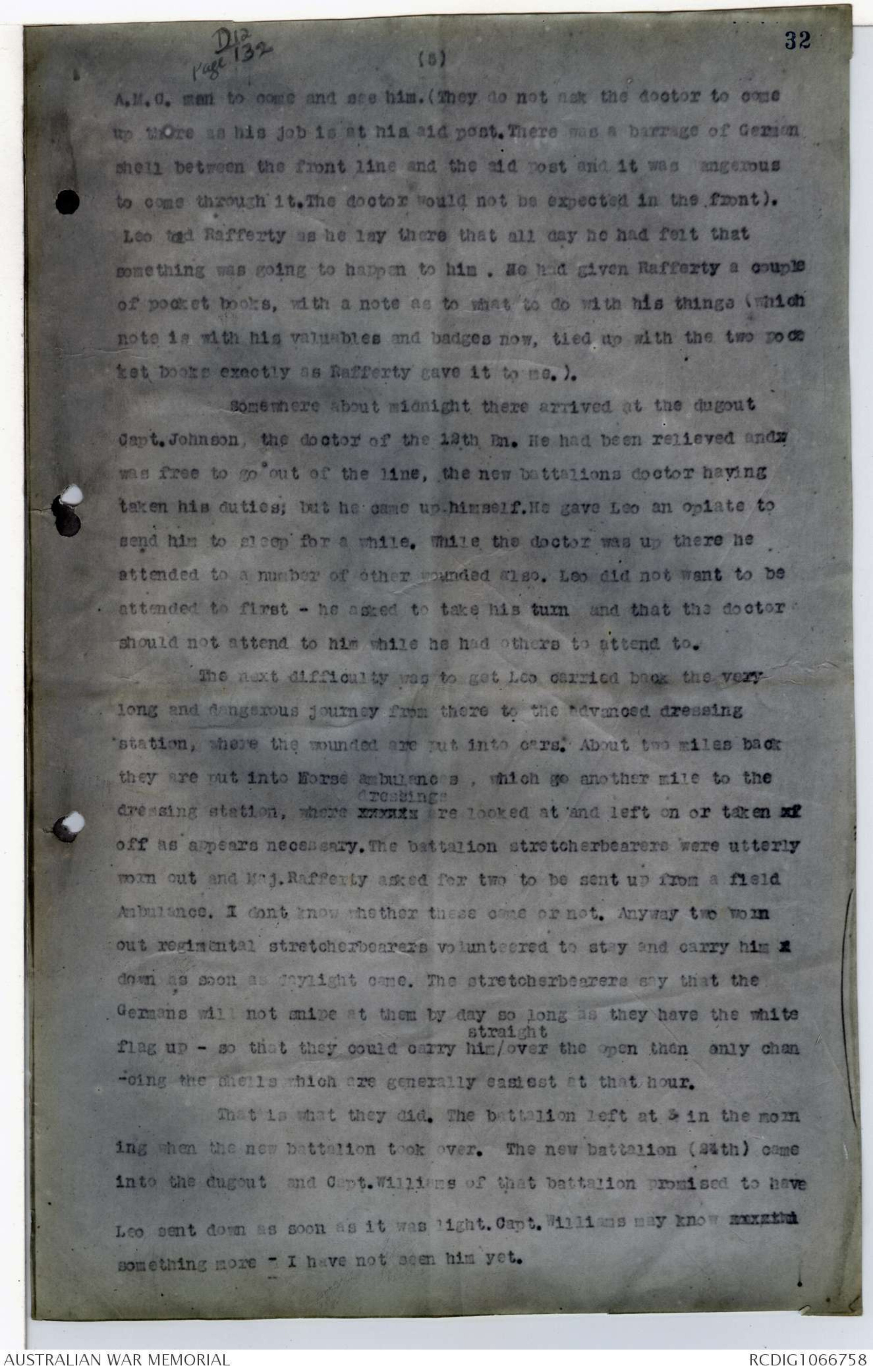
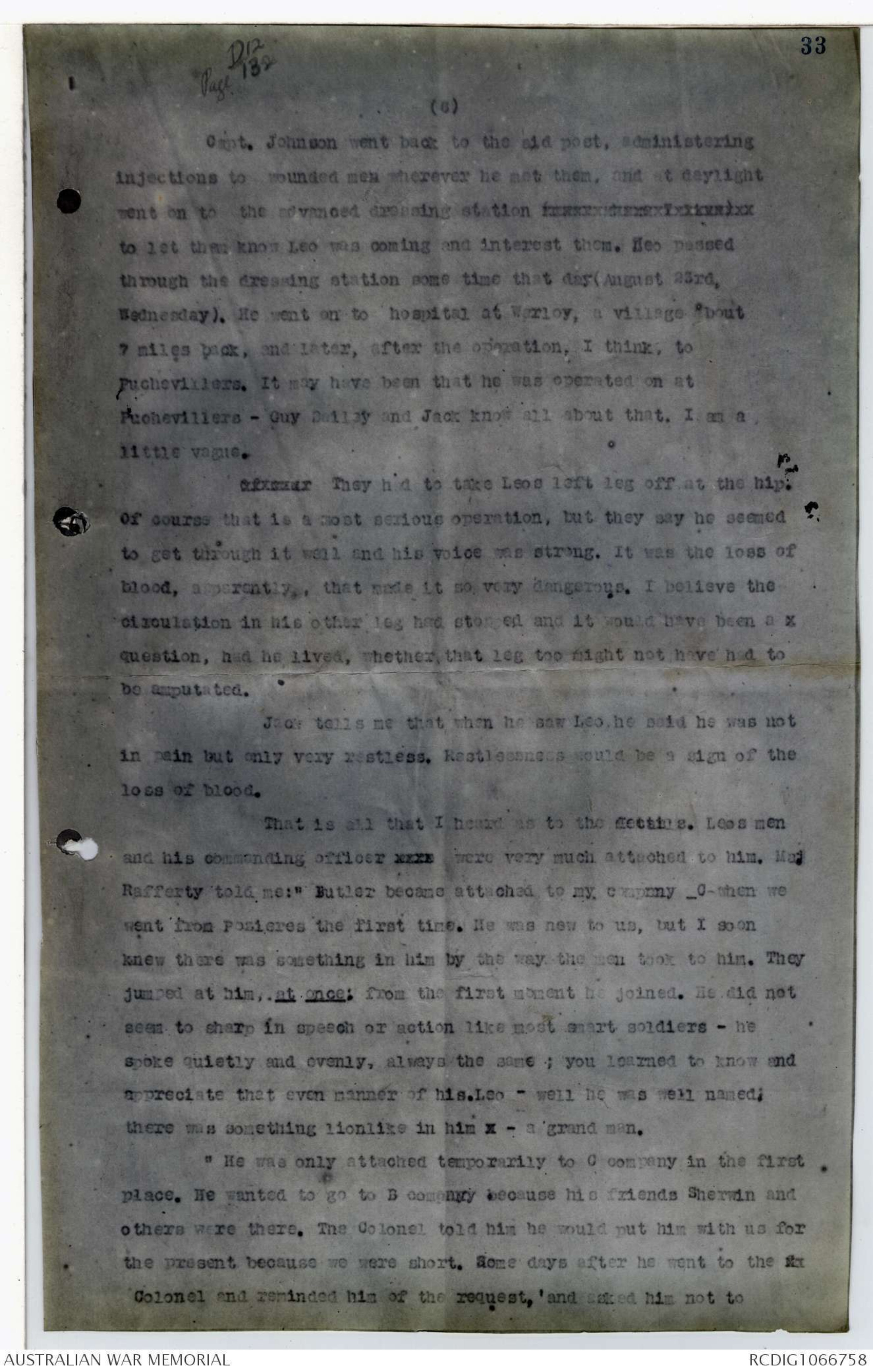
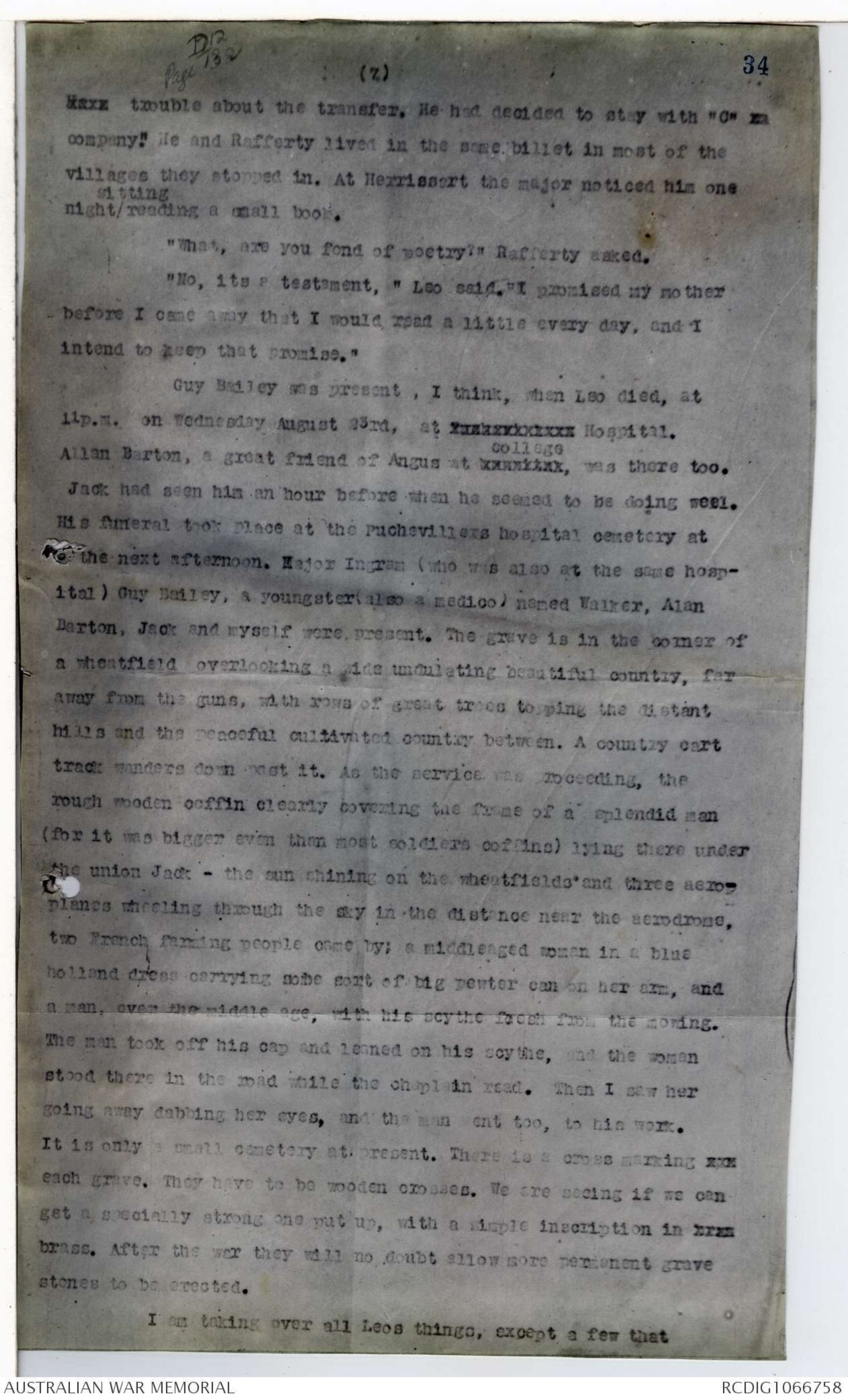
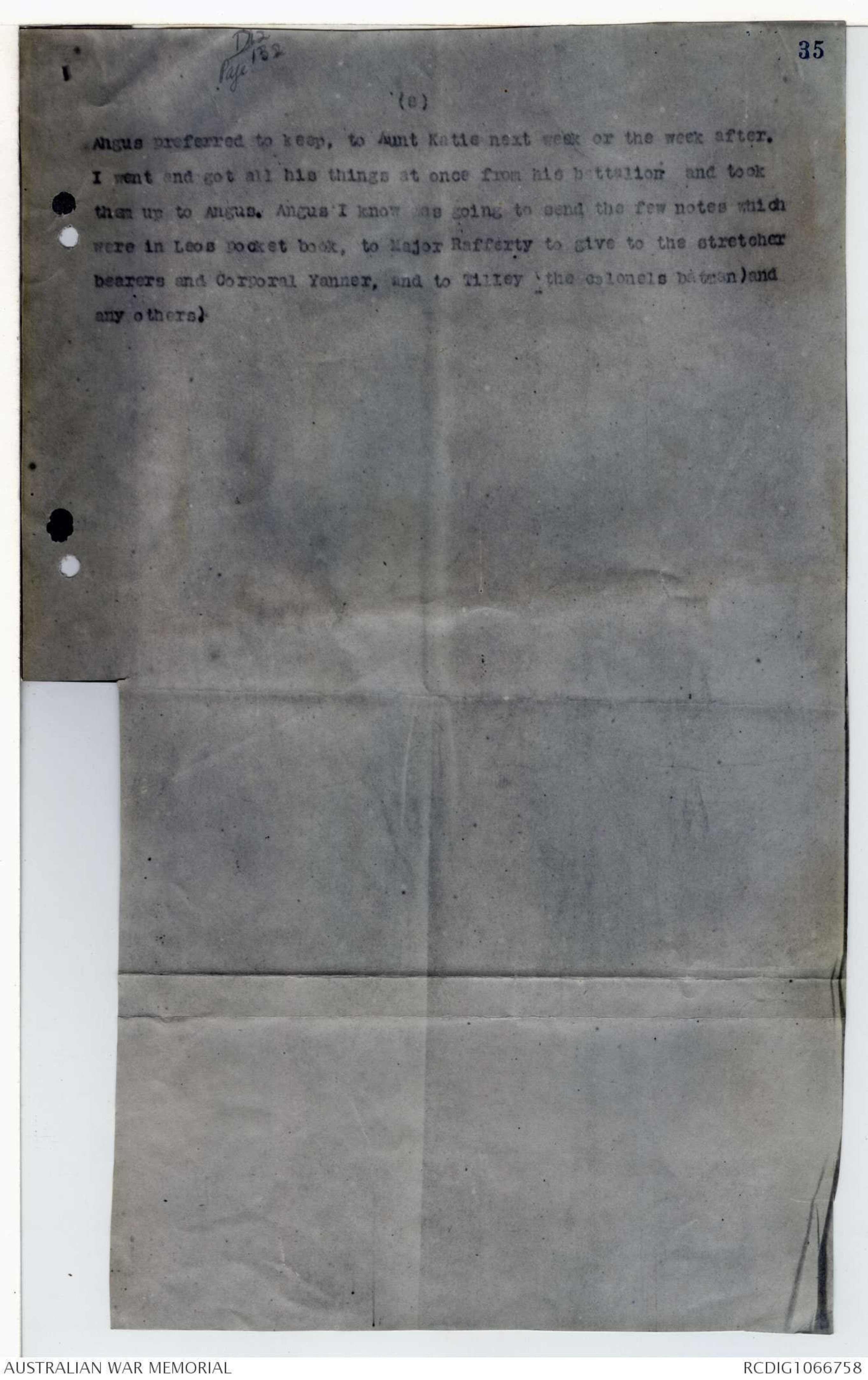
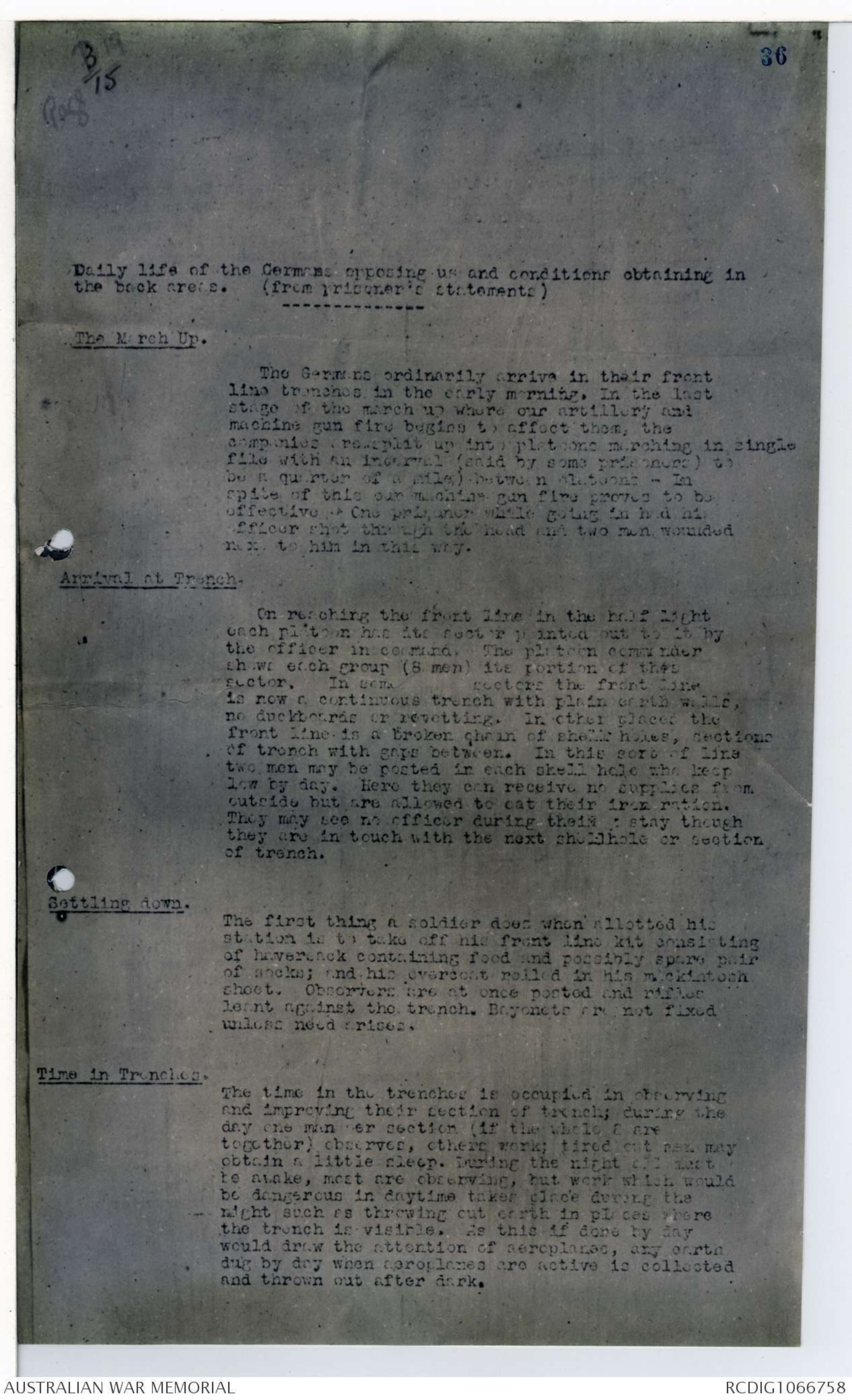
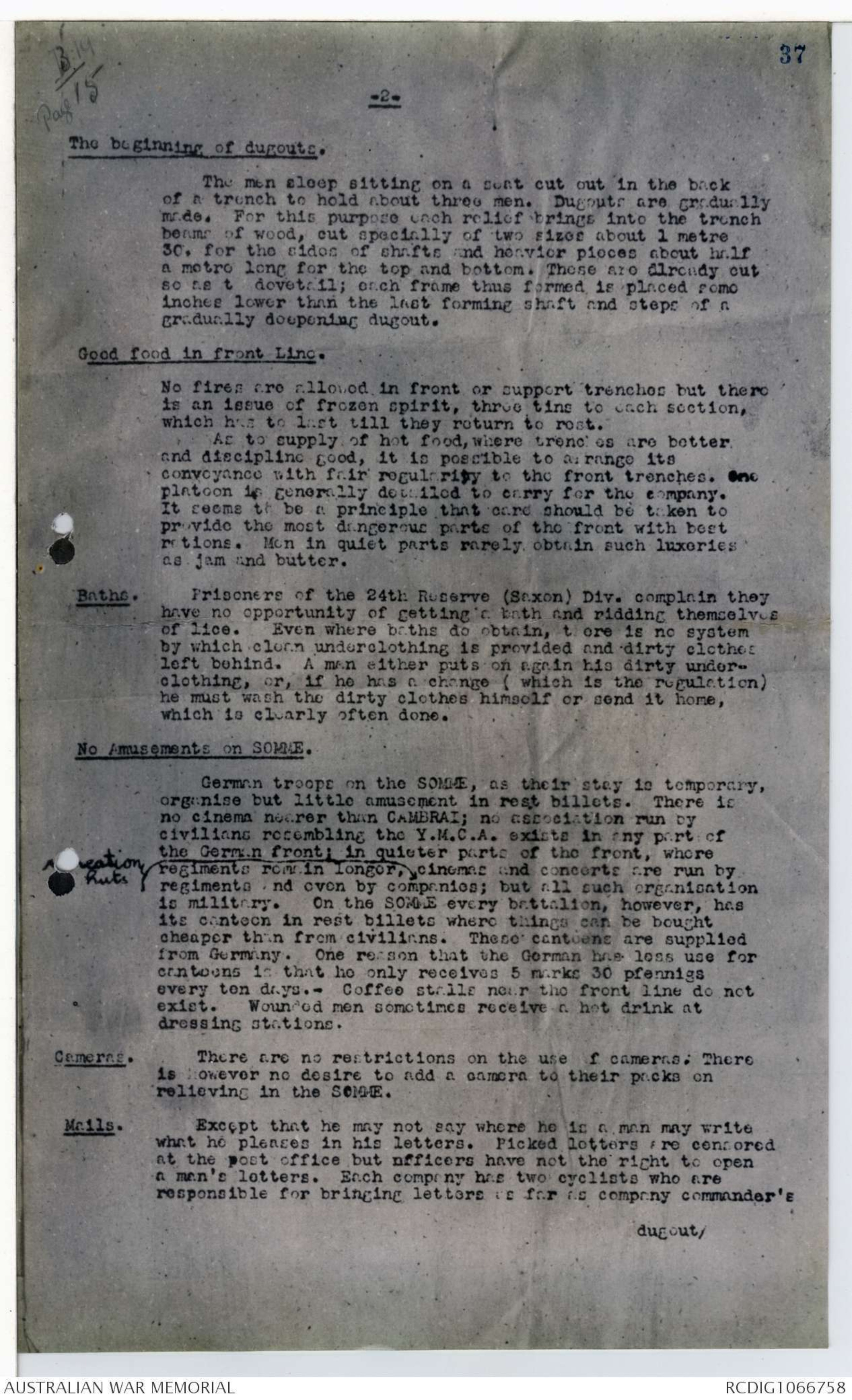
[*D12
Page 132*]
28
Lieut. E.L.A. Butler, wounded evening of Aug. 22nd
died in hospital night of Aug 23rd.
Leo was not in time to jointhe 18th Battalion before the
first battle of Pozieres. He was sent from Egypt to Etaples where
he saw Jack and played cricket against him. A draft of men had to
be sent to one of the other Divisions up North near Armentieres
after ^what they call the "Raid" there, and he was sent in charge of it. This was
just after we had left North to come South to the Battle of the xxxx
Somme. Jack wrote and told me that he had met Leo.
It was when I was going round among units in rest, during a x
lull in in the fighting at the front, that I got a letter from Leo telling
me that he was with the 12th Battalion. I saw them next day in
their billets in a French country viilage. They had been drilling xx
during the morning out in the fields and orchards and were going to
drill again at 2 o'clock; but the colonel had Leo in to lunch at xx
the little French farmers or country traders house where their headquarters
were. he was the same big Leo of the tennis court or the
camps on Sandy Bay Beach - not a bit got up for the part - with his
web kit thrown loosely round him. Of course he was quite a junior
officer, but in some sort of way Leo has always been a leader; and I
daresay his seniors looked up to him there too - I fancy they r were
beginning to do so.
He had joined up with the 12th Battalion, he told me, just x
after the first battle of Pozieres, as they were coming out for their
first rest. They were leaving the day after I saw them, to march off
towards the line again.
They went in, and, as you know, they had a stiff fight to
get some of the trenches S.W. of Mouquet Farm. They charged over about
sundown ^on Aug 21st, Leo was not with the assaulting parties. His company
was partly in it, and his company commander, Major Rafferty, was xxx
up in an advanced headquarters in the support trenches behind the xx
firing line; and I fancy he kept Leo doing much the same work for xx
him that an adjutant would do at regimental headquarters. The shelling
was fierce on the support trenches that night.
next morning early, while the mist was still on the country
[*D12
132*]
(2)
29
I went round with the divisional intelligence officer. The
trenches, as we reached this part of the line, were just an open
waving brown furrow - they had been blown to pieces by shelling during
the night before.Little bits of them were remaining at intervals
- enough for the men to sit in, but you had to get from one sound
bit to another by a path which ran over the top of heaps of tumbled
earth.
We were on the Northern slope of a spoon shaped valley runningxxxxxx Westwards, from the ridge along which we have fought, dipping
towards the South of Thiepval. It was green country - field or meadow
probably a good deal of thistle - three or four weeks back. But
it is like a completely ploughed field now. I dont remember one
blade of green. The impression you had was that you were walking
over ploughed land.
We had just ducked off from the trench to a hole about
ten yards away - a biggis crater I think - from which there descended
into the earth the mouth of a German dugout. This was Major Raffertys
headquarters. We descended the steep stair, and as I did so I heard
a voice say "hallo Charlie!" It was Leo. I was awfully thankful to
see him, because I knew how wild the night had been. He told me then
that he had not xxxxxxxx been over with the troops who attacked. What he did
not say, but what I found out afterwards, was that as a matter of
fact it had been comparatively light fIre upon the front line xxxx
and far worse amongst the supports. He told me the shellfire had been
very heavy so did everyone in this part of the line.
We stayed yarning in the half dark on the lower steps of
the narrow low stairway into the dugout, and then Leo had to go off
and see about getting rations to his platoon. When we left some time
later I passed him sitting under the parapet of the trench nearby
with a line of six or eight others, squatting with their backs against
the front of the trench, talking. The top of his head as he sat
only came a little above the parapet of the trench. They were to
come out that night. The battalion had got a little more than its
objective, and one felt very happy about them, and especially to xxx
have seen Leo safe xxxxxxxxxxxxx after that night. "See you in a day or
two", we said as I left.
[*D12
132*]
30
(3)
As we went on the trench got much worse, being barely,
recognisable in parts. Later, and a long way to the rear, it xxxxxx
improved. It was somewhere about his bad bit of trench that the position
of Leos platoon had to be that evening.
I heard no more of the battalion, thinking they had
gone out all right and that I would see them later, until Jack came
to visit me three days later, and told me the news of Leos death and
we went straight away to send a telegram to Angus and to Leos funeral
at Puchevillers. That night I went up and saw the 12th Battalion. xx
The news of his death came as a blow to them for they had thought
that he was doing well, and he was exceedingly xxxxxxxx popular.
From them I heard the following details:
The Victorian troops, relieving the Battalion Leo belong-
to, arrived at the beginning of the ridge late in the afternoon xxxx
before. I do not know, but I think that they were seen either by
Germans further along the ridge, or else by German aeroplanes which
came over that afternoon. I think Leo thought it was the aeroplanes
that did it for he said something later to Jack or Guy Bailey about
their having been seen by German planes. Anyway between six oclock x
and sunset the Germans started a heavy bombardment on the xxxxxx
position. x
Leo had been given a spell (which probably means a sleep
for a few hours down in the dark of Maj.Raffertys dugout) and was to
be sent out about dark xxxxxx with a platoon which had not been in
front, to relieve the men who were digging in the front line captured
the night before, a few yards from ^the particular square of earth called Mouquet Farm. This platoon was
a small one - Perhaps 30 or 40 men, mixed from B and C companies. Xx
For the moment they were in xxx a little stretch of the smashed trench
mentioned above, acting as a guard for that flank of the battalion -
although in a support trench, there was nothing between them and the
enemy and they were acting as garrison in case he came in from that
direction. If the relief had not been coming in and the avenues congested,
this platoon, and Leo, would have been sent up about 6 pm, but
it was deferred.
The shelling came down very heavily, as usual, on the xx
[*D12
Page 132*]
31
(4)
support trenches. Between 9. pm and 9.15 pm - that is to say just
before night, but while there was still xxxxxxxxxx - the last fading
light of the sunset - just enough to see by - Leo was hit by a piece
of high explosive shell. The shell killed one man, Richardson,
alongside of him. It severed Leos left leg below the knee, and
I think hit two toes in his right foot also. If not, these were hit
later when he was being carried up, but I believe it was the same
shell. A big corporal named Yanner, who was there, a big slack fellow,
not one of their best men in ordinary times, picked him up at
once; and though Leo was a big heavy man this chap carried him on
his back up through the bombardment about 150 yards up the trench
to a point where the trench was blocked by the dead or wounded. Xxx
Yanner was in an exhausted state by this time. xxxxx It was up hill
and very heavy going in and out of craters. Yanner put him down here
in such shelter as the trench gave and ran on to Maj.Raffertys to xx
report and get help. There was a hurried conference as to whether it
would be better to leave Leo in the trench where he was until medical
aid came and it was decided that it was safer to carry him to the
dugout. Two stretcherbearers went out at once and Tilley, Major Raffertys
batman, volunteered to guide them ^back - xxxxxxxxxxxxx . They
found him, and put him on the stretcher; but the trench was so congested
owing to the relief going on that they had to climb out of it
and carry him back ^through shell fire over the open. The stretcher was carefully let
down the steep shaft staircase into the dugout - I suppose the descent
is at least 25 to 30 feet leading to a tiny chamber about 16
feet underground.
Leo was very calm and collected. I think he knew he must
have lost a lot of blood for he xxxxxxxx mentioned to them that
there was a lot of blood on the stretcher, beneath him. But I believe
he was not bleeding externally when the doctor arrived later. The
stretcherbearers or his own men had put a tourniquet on the leg and
this had stopped the bleeding early. I believe that Leo for a time
stopped it himself by pressure.
Leo lay there very quietly. They would not let him talk,
and they did not let him know that they had sent for an experienced
[*D12
Page 132*]
32
(5)
A.M.C. man to come and see him. (They do not ask the doctor to come
up there as his job is at his aid post. There was a barrage of German
shell between the front line and the aid post and it was dangerous
to come through it.The doctor would not be expected in the front).
Leo told Rafferty as he lay there that all day he had felt that
something was going to happen to him. He had given Rafferty a couple
of pocket books, with a note as to what to do with his things (which
note is with his valuables and badges now, tied up with the two pocket
books exactly as Rafferty gave it to me.).
Somewhere about midnight there arrived at the dugout
Capt. Johnson, the doctor of the 12th Bn. He had been relieved andx
was free to go out of the line, the new battalions doctor having
taken his duties; but he came up himself. He gave Leo an opiate to
send him to sleep for a while. While the doctor was up there he
attended to a number of other wounded also. Leo did not want to be
attended to first - he asked to take his turn and that the doctor
should not attend to him while he had others to attend to.
The next difficulty was to get Leo carried back the very
long and dangerous journey from there to the advanced dressing
station, where the wounded are put into cars. About two miles back
they are put into Horse ambulances, which go another mile to the
dressing station, where xxxxxx dressings are looked at and left on or taken xx
off as appears necessary. The battalion stretcherbearers were utterly
worn out and Maj.Rafferty asked for two to be sent up from a field
Ambulance. I dont know whether these came or not. Anyway two worn
out regimental stretcherbearers volunteered to stay and carry him x
down as soon as daylight came. The stretcherbearers say that the
Germans will not snipe at them by day so long as they have the white
flag up - so that they could carry him ^straight over the open then only chancing
the shells which are generally easiest at that hour.
That is what they did. The battalion left at 3 in the morning
when the new battalion took over. The new battalion (24th) came
into the dugout and Capt. Williams of that battalion promised to have
Leo sent down as soon as it was light. Capt. Williams may know xxxxxx
something more - I have not seen him yet.
[*D12
Page 132*]
33
(6)
Capt. Johnson went back to the aid post, administering
injections to wounded men wherever he met them, and at daylight
went on to the advanced dressing station xxxxxxxxxxxxxxxxxxxxxxx
to let them know Leo was coming and interest them. Leo passed
through the dressing station some time that day(August 23rd
Wednesday). He went on to hospital at Warloy, a village about
7 miles back, and later, after the operation, I think, to
Puchevillers. It may have been that he was operated on at
Puchevillers - Guy Bailey and Jack know all about that. I am a
little vague.xxxxx They had to take Leos left leg off at the hip.
Of course that is a most serious operation, but they say he seemed
to get through it well and his voice as strong. It was the loss of
blood, apparently, that made it so very dangerous. I believe the
circulation in his other leg had stopped and it would have been a x
question, had he lived, whether that leg too might not have had to
be amputated.
Jack tells me that when he saw Leo he said he was not
in pain but only very restless Restlessness would be a sign of the
loss of blood.
That is all that I heard as to the xxx. Leos men
and his commanding officer xxxx were very much attached to him. Maj
Rafferty told me: " Butler became attached to my company _C-when we
went from Pozieres the first time. He was new to us, but I soon
knew there was something in him by the way the men took to him. They
jumped at him, .at once: from the first moment he joined. He did not
seem to sharp in speech or action like most smart soldiers - he
spoke quietly and evenly, always the same; you learned to know and
appreciate that even manner of his.Leo - well he was well named;
there was something lionlike in him x - a grand man.
"He was only attached temporarily to C company in the first
place. He wanted to go to B company because his friends Sherwin and
others were there. The Colonel told him he would put him with us for
the present because we were short. Some days after he went to the xx
Colonel and reminded him of the request, 'and asked him not to
[*D12
page 132*]
34
(7)xxxx trouble about the transfer. He had decided to stay with "C" xx
company." He and Rafferty lived in the same billet in most of the
villages they stopped in. At Herrissert the major noticed him one
night ^sitting reading a small book.
"What, are you fond of poetry?" Rafferty asked.
"No, its a testament," Leo said. "I promised my mother
before I came away that I would read a little every day, and I
intend to keep that promise."
Guy Bailey was present, I think, when Leo died, at
11p.m. on Wednesday August 23rd, at xxxxxxxxxx Hospital
Allan Barton, a great friend of Angus at xxxxxxxx college, was there too.
Jack had seen him an hour before when he seemed to be doing well.
His funeral took place at the Puchevillers hospital cemetery at
the next afternoon. Major Ingram (who was also at the same hospital)
Guy Bailey, a youngster(also a medico) named Walker, Alan
Barton, Jack and myself were present. The grave is in the corner of
a wheatfield overlooking a wide undulating beautiful country, far
away from the guns, with rows of great trees topping the distant
hills and the peaceful cultivated country between. A country cart
track wanders down past it. As the service was proceeding, the
rough wooden coffin clearly covering the frame of a splendid man
(for it was bigger even than most soldiers coffins) lying there under
the union Jack - the sun shining on the wheatfields and three aeroplanes
wheeling through the sky in the distance near the aerodrome,
two French farming people came by: a middleaged woman in a blue
holland dress carrying some sort of big pewter can on her arm, and
a man, over the middle age, with his scythe fresh from the mowing.
The man took off his cap and leaned on his scythe, and the woman
stood there in the road while the chaplain read. Then I saw her
going away dabbing her eyes, and the man went too, to his work.
It is only a small cemetery at present. There is a cross marking xxx
each grave. They have to be wooden crosses. We are seeing if we can
get a specially strong one put up, with a simple inscription in xxxx
brass. After the war they will no doubt allow more permanent grave
stones to be erected.
I was taking all Leos things, except a few that
[*D12
Page 132*]
35
(8)
Angus preferred to keep, to Aunt Katie next week or the week after
I went and got all his things at once from his battalion and took
them up to Angus. Angus I know was going to send the few notes which
were in Leos pocket book, to Major Rafferty to give to the stretcher
bearers and Corporal Yanner, and to Tilley (the colonels batman) and
any others.)
[*B19
Page 15*]
36
Daily life of the Germans opposing us and conditions obtaining in
the back areas. (from prisoner's statements)
The March Up.
The Germans ordinarily arrive in their front
line trenches in the early morning. In the last
stage of the march up where our artillery and
machine gun fire begins to affect them, the
companies re-split up into platoons marching in single
file with an interval (said by some prisoners) to
be a quarter of a mile) between platoons - In
spite of this our machine gun fire proves to be
effective. One prisoner while going in had his
officer shot through the head and two men wounded
next to him in this way.
Arrival at Trench.
On reaching the front line in the half light
each platoon has its sector pointed out to it by
the officer in command. The platoon commander
shows each group (8 men) its portion of this
sector. In some sectors the front line
is now a continuous trench with plain earth walls,
no duckboards or revetting. In other places the
front line is a broken chain of shell holes, Sections
of trench with gaps between. In this sort of line
two men may be posted in each shell hole who keep
low by day. Here they can receive no supplies from
outside but are allowed to eat their iron ration.
They may see no officer during their stay though
they are in touch with the next shellhole or section
of trench.
Settling down.
The first thing a soldier does when allotted his
station is to take off his front line kit consisting
of haversack containing food and possibly spare pair
of socks; and his overcoat rolled in his mackintosh
sheet. Observers are at once posted and rifles
leant against the trench. Bayonets are not fixed
unless need arises.
Time in Trenches.
The time in trenches is occupied in observing
and improving their section of trench; during the
day one man per section (if the whole 8 are
together) observes, others work; tired out men may
obtain a little sleep. During the night all must
be awake, most are observing, but work which would
be dangerous in daytime takes place during the
night such as throwing out earth in places where
the trench is visible. As this if done by day
would draw the attention of aeroplanes, any earth
dug by day when aeroplanes are active is collected
and thrown out after dark.
B19
Page 15
37
-2-
The beginning of dugouts.
The men sleep sitting on a seat cut out in the back
of a trench to hold about three men. Dugouts are gradually
made. For this purpose each relief brings into the trench
beams of wood, cut specially of two sizes about 1 metre
30. for the sides of shafts and heavier pieces about half
a metre long for the top and bottom. Those are already cut
so as to dovetail; each frame thus formed is placed some
inches lower than the last forming shaft and steps of a
gradually deepening dugout.
Good food in front Line.
No fires are allowed in front or support trenches but there
is an issue of frozen spirit, three tins to each section,
which has to last till they return to rost.
As to supply of hot food, where trenches are better.
and discipline good, it is possible to arrange its
conveyance with fair regularity to the front trenches. One
platoon is generally detailed to carry for the company.
It seems to be a principle that care should be taken to
provide the most dangerous parts of the front with best
rations. Men in quiet parts rarely obtain such luxuries
as jam and butter.
Baths. Prisoners of the 24th Reserve (Saxon) Div. complain they
have no opportunity of getting a bath and ridding themselves
of lice. Even where baths do obtain, there is no system
by which clean underclothing is provided and dirty clothes
left behind. A man either puts on again his dirty underclothing,
or, if he has a change (which is the regulation)
he must wash the dirty clothes himself or send it home,
which is clearly often done.
No Amusements on SOMME.
German troops on the SOMME, as their stay is temporary,
organise but little amusement in rest billets. There is
no cinema nearer than CAMBRAI; no association run by
civilians resembling the Y.M.C.A. exists in any part of
the German front; in quieter parts of the front, where
regiments remain longer,^ [*recreation huts*] cinemas and concerts are run by
regiments and even by companies; but all such organisation
is military. On the SOMME every battalion, however, has
its canteen in rest billets where things can be bought
cheaper than from civilians. These canteens are supplied
from Germany. One reason that the German has less use for
canteens is that he only receives 5 marks 30 pfennigs
every ten days.- Coffee stalls near the front line do not
exist. Wounded men sometimes receive a hot drink at
dressing stations.
Cameras. There are no restrictions on the use of cameras: There
is however no desire to add a camera to their packs on
relieving in the SOMME.
Mails. Except that he may not say where he is a man may write
what he pleases in his letters. Picked letters are censored
at the post office but officers have not the right to open
a man's letters. Each company has two cyclists who are
responsible for bringing letters as far as company commander's
dugout/
 Deb Parkinson
Deb ParkinsonThis transcription item is now locked to you for editing. To release the lock either Save your changes or Cancel.
This lock will be automatically released after 60 minutes of inactivity.